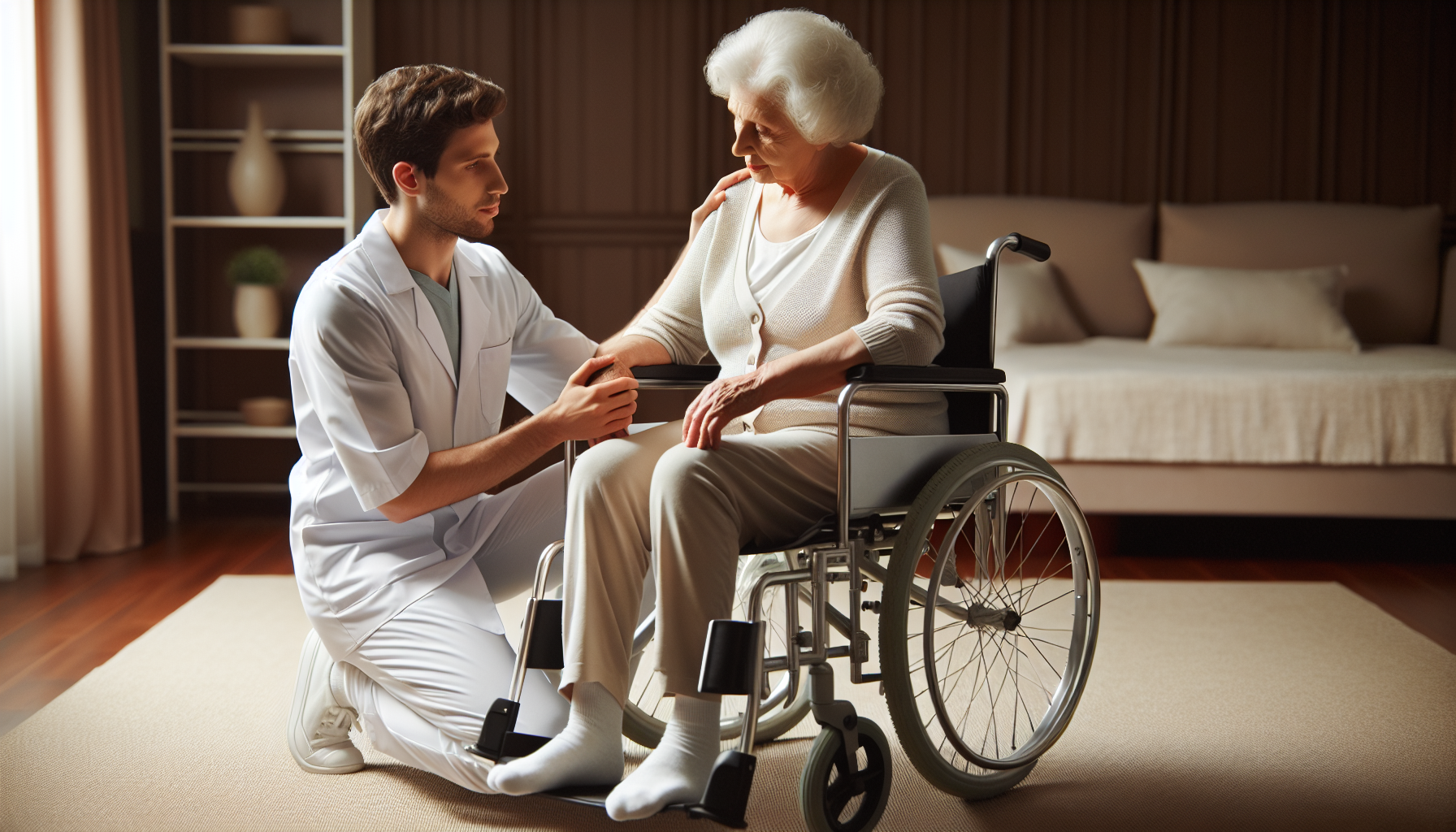Exploring the Dynamic Role of a Patient Care Tech: Duties, Skills, and Career Path
Immerse yourself in the dynamic world of patient care tech, the unsung heroes of the healthcare field. Imagine a career where every day brings new challenges, opportunities, and the chance to make a significant impact on people’s lives as a patient care tech.
Key Takeaways
- Patient Care Technicians provide patient care under the supervision of medical professionals, with projected growth and higher compensation than a Certified Nursing Assistant.
- Skills required include technical proficiency in operating medical equipment, interpersonal skills to build relationships with patients and their families, as well as adaptability to adjust strategies for personalized care.
- Benefits of this career path include making meaningful differences in patients’ lives through comprehensive care. Job satisfaction from income stability, salary & working conditions. Professional advancement opportunities & collaboration with other healthcare professionals.
Understanding the Role of a Patient Care Technician

Do you know what a doctor or a Patient Care Technician (PCT) does? They are healthcare technicians with basic care skills, working under the supervision of nurses, doctors, or other healthcare professionals to provide patient care. As the backbone of the healthcare system, they offer critical support to other healthcare professionals.
You might wonder, “Why should I consider becoming a PCT?” The reasons are clear:
- The projected growth of nursing assistants, including certified patient care technicians, from 2021 to 2031 is estimated to be 5%.
- The medical requirements of patients in hospitals are typically more intensive than those encountered in skilled nursing facilities, home health services, and physical therapy centers.
- Hiring PCTs to handle routine medical tasks allows RNs to focus on more complex duties.
You might also question how a PCT distinguishes themselves from a Certified Nursing Assistant (CNA). While their primary roles may be similar, PCTs possess a wider job scope and are compensated slightly more than CNAs. CNAs may have a greater capacity to concentrate on their interactions with their patients without assuming too many technical duties, especially when working closely in a clinical setting.
Daily Responsibilities
As a PCT, you must manage unexpected situations and work collaboratively with medical professionals like nurses and doctors. Your day-to-day responsibilities will be diverse and fulfilling. You’ll be involved in tasks ranging from assessing vital signs, assisting with wound care, to more intricate procedures like catheter insertion, gastric tube insertion, and IV insertion.
Even though these responsibilities may seem overwhelming, there’s no need to worry. To become a patient care technician, you’ll complete relevant trainings and certifications, practice and develop proficiency in technical and workplace skills. Through these trainings, you’ll be equipped with the skills to perform your daily duties effectively and efficiently.
Clinical Skills

As a PCT, your clinical skills are your arsenal. These skills enable you to provide comprehensive care to your patients and contribute to the smooth functioning of healthcare facilities. They include tasks such as:
- Bathing
- Feeding
- Transporting
- Lifting
- Repositioning
- Monitoring patients
However, it’s not solely about task execution. Clinical experience also involves applying your acquired knowledge in a real-world context. For instance, you would need to know how to:
- Use an electrocardiogram, a device that measures the electrical activity in the heart, providing doctors with vital information about the heart’s functioning
- Administer medications prescribed by nurses or healthcare professionals
- Monitor patient medications
Work Environment
Various medical settings, such as:
- hospitals
- doctor’s offices
- clinics
- nursing homes
- home health care services
can be your workplace as a PCT. Beyond hospitals, there’s a high demand for PCTs in kidney care centers, where they assist with dialysis treatments.
The job outlook for patient care technicians and other types of nursing assistants is promising. Here are some key points:
- Growth rate of 8 percent between 2020 and 2030
- Expected to grow as fast as the average for all occupations
- Salary range between $23,880 and $44,240 per year
- Average hourly rate of $11.48
With these factors, there’s an attractive financial incentive to consider this profession.
The Journey to Becoming a Patient Care Tech
Like any journey, becoming a PCT starts with a single step, which is acquiring a high school diploma. However, that’s just the beginning. To become a patient care technician, you’ll need proficiency in technical and workplace skills, as well as completion of relevant trainings and certifications.
The next step is enrolling in a training program. However, before proceeding, researching the specific educational requirements made for your state is a necessity. Some states necessitate professionals in this type of role to be licensed and/or certified. Thus, investigating state requirements is critical prior to seeking out a training program.
For those eager to expedite their healthcare career, embarking on CNA training could be a feasible strategy. This provides the perfect opportunity to pursue the same CNA certification and career path that best suits you.
Educational Foundation
To pursue a career as a Certified Nursing Assistant (CNA), one must:
- Complete a certified training course
- Pass a CNA competency exam
- Be 16 years or older
Completing a Certified Nursing Assistant’s Training Program lays the groundwork for becoming a Certified Patient Care Technician.
In a certified nursing assistant’s training program, which prepares certified nursing assistants for their roles, you can expect to find courses such as:
- Basic nursing skills
- Anatomy and physiology
- Infection control
- Patient care techniques
- Medical terminology
- CPR and first aid training
While the typical length of a certified nursing assistant’s training program can vary from two weeks to more than six months, the skills and knowledge you gain from this program will be invaluable in your journey to becoming a PCT. Northeast Medical Institute offers a Self Paced Hybrid CNA Program throughout Connecticut.
Training Program Essentials

After establishing the educational groundwork, your next move is to enroll in a patient care technician training program. A typical patient care technician program includes a blend of theoretical and practical learning, such as the hybrid training offered by the Northeast Medical Institute. The program typically requires 5 weeks of study, during which you will gain knowledge of direct patient care techniques, including:
- first aid
- wound care
- catheterization
- CPR
These training programs also comprise an externship, providing you with an opportunity to apply your knowledge in a real-world scenario. It’s like a dress rehearsal for the real thing, ensuring you are equipped with the necessary skills to transition to the healthcare setting with confidence and competence.
Certification Process
After completing the training program, the final step is to obtain certification as a patient care technician. The National Healthcareer Association offers CPCT/A and/or CPT credentials. However, before taking the certification exam, you’ll need to complete a training program.
Though the path to becoming a PCT may appear lengthy, each step contributes to enhancing your knowledge, honing your skills, and boosting your confidence. And the end result is a rewarding career where you can make a real difference in people’s lives.
Key Qualifications and Attributes for Success
Certain qualifications and attributes can pave the way for your success as a patient care technician. Some essential qualifications and attributes for a successful patient care technician include:
- Patience
- Empathy
- Strong communication skills
- The capacity to collaborate effectively
- Medical knowledge
- Medical technical proficiency
- Communication expertise
- Organizational aptitude
These qualifications and attributes are not just beneficial, but vital for performing your daily tasks and duties effectively.
Beyond technical skills, interpersonal skills are also of paramount importance for a patient care technician. These skills enable you to offer emotional support, communicate effectively with patients, and collaborate effectively with the healthcare team. In addition, adaptability is essential for a patient care technician in order to accommodate changing environments, work processes, and patient needs.
Technical Proficiency

Your most valuable asset as a PCT is your technical skills. You will need to demonstrate proficiency in operating a range of medical equipment, such as:
- blood pressure monitors
- electrocardiogram (ECG) machines
- pulse oximeters
- glucose meters
- nebulizers
- suction machines
- urinary catheters
- intravenous (IV) pumps
- oxygen delivery systems
- wheelchairs and patient lifts
Beyond operating medical equipment, you’ll also be required to perform a variety of medical procedures. This includes:
- Feeding
- Bathing
- Repositioning
- Moving patients
- Assisting with medical procedures such as catheter insertion, wound dressings, and specimen collection, under the supervision of a nurse.
Interpersonal Skills
The role of a PCT extends beyond performing tasks and procedures to establishing connections and cultivating relationships. This is where interpersonal skills come in.
As a PCT, you’ll be dealing with patients and their families on a daily basis. This requires:
- Empathy
- The ability to listen actively
- Asking questions
- Providing comprehensible explanations
- Displaying genuine interest in assisting patients.
Moreover, you’ll need to work as part of a team. Collaboration in a patient care setting:
- improves patient care and outcomes
- mitigates medical errors
- expedites initiation of treatment
- decreases inefficiencies.
Adaptability in Patient Care Settings
Given the ever-evolving healthcare environment, adaptability is a must for a full PCT program. This includes:
- Adjusting your approach when interacting with patients of varying ages, backgrounds, and medical conditions
- Responding to emergencies
- Working with a multidisciplinary healthcare team
Adaptability is essential as it enables healthcare professionals to effectively respond to the varying needs and conditions of patients. By being adaptable, you can adjust your approach, strategies, and techniques to their basic needs and provide personalized and high-quality care.
Advancing Your Career as a Patient Care Tech
Armed with the appropriate skills, experience, and attitude, you have the potential to propel your PCT career forward. This could mean taking on more complex roles, specializing in a certain area of patient care, or even transitioning into a supervisory or management position.
Remember, evolving as a PCT extends beyond climbing the career ladder. It’s also about expanding your skills, gaining new experiences, and contributing more to the healthcare field. This could mean taking on extra responsibilities, staying abreast of advancements, or pursuing professional development opportunities.
In terms of job outlook, the future employment opportunities for PCTs looks promising. Healthcare positions, including patient care technicians, are projected to experience a 13% growth in employment by 2031.
Specialized Training Opportunities
Though a PCT training program provides a robust foundation of skills and knowledge, opportunities for further skill specialization exist. Employers in the medical field prefer candidates with specialized training, including:
- healthcare certifications
- team skills modules
- pharmacy technician certification
- formal training in a specific field
- specialized training and experience in a particular field or subfield.
Several online platforms many training programs and institutions offer specialized training for patient care technicians. These training programs are designed to complement your work schedule and help you gain additional skills and knowledge at your own pace.
Growth Through Experience
Working as a PCT is a learning journey; the more you work, the more you learn. On-the-job experience offers invaluable practical skills and knowledge that cannot be obtained in a classroom setting. Through hands-on experience, patient care technicians gain a comprehensive understanding of patient care procedures, medical equipment operation, and communication skills.
Experience can also open up new opportunities for career advancement. With experience and additional education, you can advance to supervisory or management roles within healthcare organizations.
The Future of Patient Care Tech Employment

PCT employment holds a promising future. The job growth rate for patient care technicians in the US is estimated to be approximately 13% by 2031. This growth is driven by factors such as the projected increase in employment of nursing assistants, the growing population, and the demand for healthcare services.
Certain regions or states also have an elevated demand for patient care technicians. For instance, California, New York, and Texas are states with an increased demand for PCTs.
The Rewards of a Patient Care Technician Career
Working as a PCT offers more than just a job – it’s a calling. It’s a career that allows you to:
- Make a difference in the lives of patients every day
- Experience personal satisfaction
- Achieve professional growth
- Be part of a community that’s committed to improving healthcare
And the rewards go beyond just a paycheck.
Making a Difference
As a PCT, you hold the potential to profoundly impact your patients’ lives. You provide comprehensive care that encompasses physical, emotional, and spiritual support.
Your daily interactions with your patients can inspire them, humanize their healthcare experience, and improve the quality of their lives. By providing emotional support, helping patients through empathy, active listening, and creating a safe and supportive atmosphere, you can assist patients and make a significant difference in the lives of your patients and their families.
A Collaborative Role
Additionally, being a PCT involves playing a crucial role in the team. You’ll work closely with other healthcare professionals to provide the best care to your patients. Your collaborative role ensures that all aspects of the patient’s health are addressed adequately and improves the quality of care provided.
This teamwork not only enhances the patient’s experience but also creates a supportive and collaborative work environment for you and your colleagues.
Career Satisfaction
Lastly, pursuing a career as a PCT yields significant career satisfaction. You’ll enjoy:
- Income stability
- Job security
- Co-worker relationships
- Salary
- Working conditions
All of these factors contribute to a patient care technician’s career satisfaction.
It’s also about the intangible rewards. Some of these include:
- The sense of fulfillment that comes from aiding individuals and enhancing their wellbeing
- The possibility for individual and professional advancement
- The capacity to have a positive effect in the healthcare industry
Summary
In conclusion, a career as a Patient Care Technician is a challenging yet rewarding journey. It offers the opportunity to make a difference in the lives of patients, work in a collaborative environment, and find personal satisfaction in your work. While the path to becoming a PCT requires dedication, the rewards are well worth the effort. So, are you ready to embark on this rewarding journey?
Frequently Asked Questions
What does a patient care technician do?
Patient Care Technicians provide daily care for patients, including measuring and documenting vital signs, helping them to move around the clinic, and identifying patient concerns. They also help with eating, drinking, bathing, dressing, using the bathroom, and maintaining a comfortable and competent daily routine.
Is patient care tech the same as CNA?
Patient care technicians (PCTs) and certified nursing assistants (CNAs) are similar in that they provide basic care for patients, but PCTs have additional training that allows them to complete more tasks.
How do I get PCT?
To become a PCT, students can complete a patient care technician program, or they can complete another allied health program such as a medical assisting or nursing assistant program.
What are the daily responsibilities of a Patient Care Technician?
As a Patient Care Technician, you would be responsible for assessing vital signs, drawing blood from, assisting with wound care, inserting catheters, gastric tubes and IVs.
What qualifications are necessary to become a Patient Care Technician?
To become a Patient Care Technician, you need to have a high school diploma and complete a Certified Nursing Assistant’s Training Program. Additionally, proficiency in technical and workplace skills is essential.
https://sites.google.com/view/northeastmedicalinstitutenh/home

